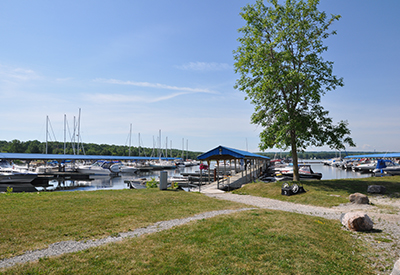REDUCE FATALITIES CAUSED BY ELECTRIC SHOCK DROWNING IN POOLS AND AT MARINAS

June 30, 2017
The Canada Day weekend is sure to see countless people celebrating and jumping into the water to cool off. But especially in fresh water lakes and rivers, when you are near marinas and other sources of electricity, there is a risk of electric shock drowning.
Marina owners should always clearly post signs telling visitors never to swim near their docks.
In the United States, there have been many tragic drownings and this year, the National Fire Protection Association (NFPA) and Electrical Safety Foundation International (ESFI) are joining forces to remind people about the potential electrical hazards in swimming pools, hot tubs and spas, on board boats and in the waters surrounding boats, marinas and launch ramps.
Electric shock drowning (ESD) can occur when faulty wiring sends an electrical current into the water, which passes through the body and causes paralysis, and ultimately results in drowning.
“Most consumers, including boat and pool owners and swimmers, are not aware of the risks of electric shock drowning,” said Lorraine Carli, NFPA’s vice president of Outreach and Advocacy. “By sharing our water safety resources, NFPA and ESFI hope to educate people so that they can safely enjoy summer water activities.”
ESFI and NFPA have pool and marina safety resources, including tip sheets and infographics, brochures, reference guides and checklists that cover safety devices, common ESD causes and prevention methods, response protocol, and marina electrical safety considerations. ESFI and NFPA also recommend the following tips for swimmers, pool and boat owners:
Tips for swimmers:
• Never swim near a marina, dock or boatyard, or near a boat while it’s running.
• While in a pool, hot tub or spa, look out for underwater lights that are not working properly, flicker or work intermittently.
• If you feel a tingling sensation while in a pool, immediately stop swimming in your current direction. Try and swim in a direction where you had not felt the tingling. Exit the water as quickly as possible; avoid using metal ladders or rails. Touching metal may increase the risk of shock.
Tips for pool owners:
• If you are putting in a new pool, hot tub or spa, be sure the wiring is performed by an electrician experienced in the special safety requirements for these types of installations.
• Have a qualified electrician periodically inspect and — where necessary — replace or upgrade the electrical devices or equipment that keep your pool, spa or hot tub electrically safe. Have the electrician show you how to turn off all power in case of an emergency.
• Make sure any overhead lines maintain the proper distance over a pool and other structures, such as a diving board. If you have any doubts, contact a qualified electrician or your local utility company to make sure power lines are a safe distance away.
Tips for boat owners:
• Avoid entering the water when launching or loading a boat. Docks or boats can leak electricity into the water causing water electrification.
• Each year, and after a major storm, have the boat’s electrical system inspected and upgraded by a qualified marine electrician to be sure it meets the required codes of your area, including the American Boat & Yacht Council (ABYC). Check with the marina owner who can also tell you if the marina’s electrical system has recently been inspected to meet the required codes of your area, including the National Electrical Code® (NEC).
• Have ground fault circuit interrupters (GFCI) installed on the boat; use only portable GFCIs or shore power cords (including “Y” adapters) that are “UL-Marine Listed” when using electricity near water. Test GFCIs monthly.
“Many swimmers, boat and marina operators unknowingly place themselves in danger by swimming near electric-powered boats and docks,” said Brett Brenner, ESFI president. “As incidents of electric shock drowning continue to occur every year, we are collaborating with NFPA to emphasize the importance of regular electrical inspections of pools, boats, and docks performed by qualified electricians to help prevent these tragedies while out on the water.”
ESFI has additional spa tips and resources for marina operators on raising awareness of electric shock drowning, as well as steps for keeping marinas and boats safer for patrons.
For information and resources about electric shock drowning, please visit www.nfpa.org/watersafety and the ESFI website.



























